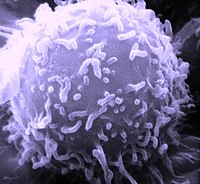
Photo from wikipedia
Infectious disease outbreaks and pandemics have repeatedly threatened public health and have severely strained healthcare delivery systems throughout the past century. Pathogens causing respiratory illness, such as influenza viruses and… Click to show full abstract
Infectious disease outbreaks and pandemics have repeatedly threatened public health and have severely strained healthcare delivery systems throughout the past century. Pathogens causing respiratory illness, such as influenza viruses and coronaviruses, as well as the highly communicable viral hemorrhagic fevers, pose a large threat to the healthcare delivery system in the United States and worldwide. Through the Hospital Preparedness Program, within the US Department of Health and Human Services Office of the Assistant Secretary for Preparedness and Response, a nationwide Regional Ebola Treatment Network (RETN) was developed, building upon a state- and jurisdiction-based tiered hospital approach. This network, spearheaded by the National Emerging Special Pathogens Training and Education Center, developed a conceptual framework and plan for the evolution of the RETN into the National Special Pathogen System of Care (NSPS). Building the NSPS strategy involved reviewing the literature and the initial framework used in forming the RETN and conducting an extensive stakeholder engagement process to identify gaps and develop solutions. From this, the NSPS strategy and implementation plan were formed. The resulting NSPS strategy is an ambitious but critical effort that will have impacts on the mitigation efforts of special pathogen threats for years to come.
Journal Title: Health security
Year Published: 2022
Link to full text (if available)
Share on Social Media: Sign Up to like & get
recommendations!